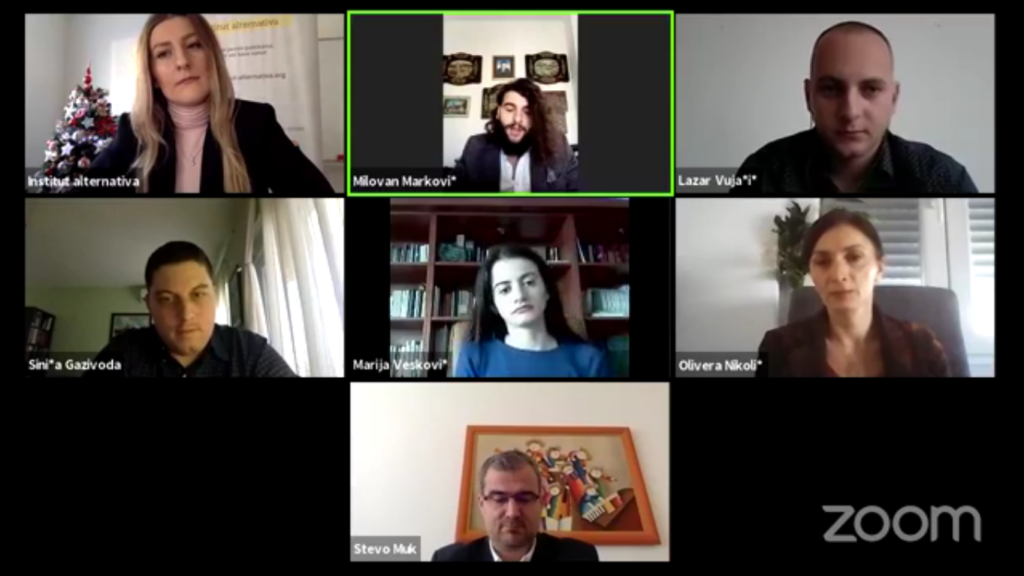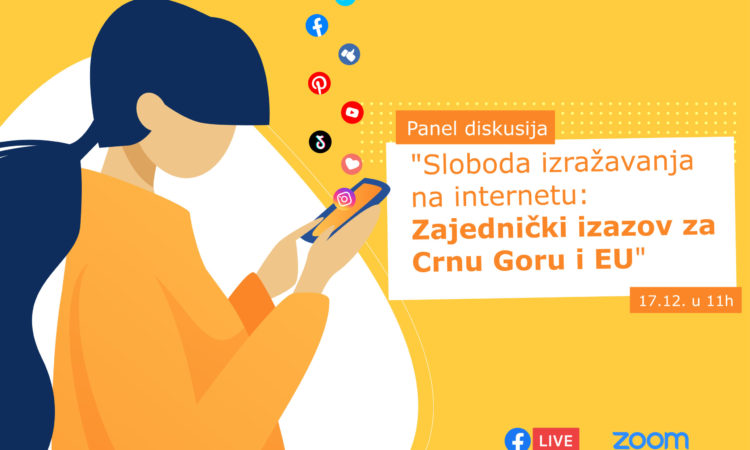Representatives of the NGO Mladiinfo Montenegro attended a panel discussion entitled “Freedom of expression on the Internet: A common challenge for Montenegro and the EU”, organized by the NGO Institute Alternative on December 17, 2020 on the Zoom platform.
The panel discussion was organized within the project “Making a Future Together: The EU and the Western Balkans from a Youth Perspective”, implemented by the Institute Alternative with other TEN partners, and together with the Institute for International Affairs in Rome, Bronsilav Geremek Foundation Centre in Warsaw and the European Policy Centre (EPC) in Brussels. The project is funded by the European Union through the Europe for Citizens programme.
Stevo Muk – President of the Managing Board of the Institute Alternative, Siniša Gaziovoda – lawyer and human rights expert, Marija Vesković – Human Rights Action, Olivera Nikolić – Montenegro Media Institute and young people spoke at the panel discussion.
In the first part of the event, the conclusions from the consultative meeting with young people “Youth Online” were presented.
Stevo Muk said that the goal of this project is to encourage citizens from the Western Balkans and the European Union, especially young people, to discuss issues that represent common problems or interests of each other and to involve young people in debates on issues that directly or indirectly affect them.
During the meeting with young people “Youth Online”, it was concluded how young people in Montenegro see the pros and cons of the internet and social networks and how much time they spend on social networks, whether they had bad experiences and what those experiences were. There was also talk about how this area should be regulated and who should be in charge of it.
Then the young people who took part in the consultative meeting “Youth Online” presented their conclusions.
First they talked about the good sides of social media. As an advantage, they mentioned the possibility of faster and easier communication as well as faster availability of information, although it can be a double-edged sword. The entertainment side of social networks was also mentioned, as well as easier business management.
Then they talked about the bad sides of social networks and internet. The downsides they singled out were the impact on the psyche and the easy spread of misinformation. They said that social networks often cause addiction.
“In that sea of information that we receive and of various contents, the value system in society has been disrupted, and as a result we have young people increasingly imitating, say, celebrities, and coming into confusion with their personality by trying to be something they are not and that is where dissatisfaction and complexes occur”, said one of the panelists.
They also cited the constantly negative news on television regarding the current pandemic as negative.
As well as the good side, easy availability of information can also be bad due to the impossibility of checking the credibility of information sources (fake news).
One of the solutions they have reached is the establishment of a specific body or agency at the level of the European Union where all member states as well as accession countries would be involved and represented. It would exist at the federal level and at the micro level and would be composed of experts: lawyers, IT experts, psychologists.
They also said that the regulation of posts and news on social networks should not be left to social network companies, but should be placed in some legal framework.
Siniša Gazivoda spoke about freedom of expression. He said that when it comes to freedom of expression and social networks, we do not have a special legal framework, e.g. we don’t have a social media law.
Marija Vesković from the Human Rights Action spoke about cases that were punished for posting on the internet or social networks. She said that a large number of cases happened in January this year, that is, during the first wave of coronavirus, because they were prosecuted on the basis of the Criminal Code, ie. due to the criminal offense of causing panic and disorder or on the basis of the law on public order and peace, even though these posts were on private profiles.
She also said that we cannot treat people on social networks as journalists, and that these people do not have a certain degree of responsibility that journalists have when presenting certain news.
“Unlike individuals or personal profiles, the media imply a certain type of transparency and certain laws are applied to their work, such as the law on the media, journalistic ethics, the law on obligations. There is no such thing when it comes to individuals”, said Vesković.
Olivera Nikolić from the Montenegro Media Institute said that 44 percent of people in Montenegro use the internet and that research shows that we still have a digital divide because every 10th child, aged 9 to 17, does not have internet access and every fifth parent doesn’t use internet. “This means that children growing up in the digital age and not using the Internet are deprived of many opportunities, such as developing the digital skills they need in the labor market,” Nikolić said.
She said that for years we have been witnessing the contamination of digital space in terms of information such as their content, narratives and more. She also said that the way of communication on the internet is very fierce, unpleasant and full of offensive speech.
“Education, trust in credible media, proactivism to point out these external toxic narratives are key, because one can only fight against lies with the truth”, Nikolić concluded.


